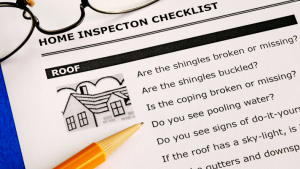Are Home Buyers Forced To Conduct a Home Inspection?

[mashshare]
Before you buy a home, one of the things you should do is to have it checked out by a professional home inspector. Yes, we can hear your objection. Buying a home is expensive enough as it is! Why would people choose to fork over hundreds more if they are not required to?
Luckily for you, CORE Member, for today’s blog we will be talking about home buyers that are forced to conduct a home inspection. Is it really required? Let us begin this blog!
A Home Inspection: What to Expect?
Before closing on your new home, a professional home inspection can ensure you’re aware of any issues. A home inspection can assist you in making a more informed decision about the property you’re considering purchasing. They can spot potential problems and give you a better idea of how much maintenance the property will need in the future. A thorough home inspection can save you thousands of dollars in unexpected repairs — or prevent you from buying a money pit unwittingly.
So, what exactly is a home inspection?
A home inspection is a visual examination of the physical structure and mechanical systems of a home, including the roof, ceilings, walls, floors, windows, and doors. The inspector will test major appliances, examine the heating and air-conditioning system, inspect the plumbing and electrical systems, and possibly go into the attic and basement. A home inspection’s goal is to find problems with the house itself. Inspectors will not tell you if you’re getting a good deal on a house or give you an opinion on the sale price.
When will the house be inspected?
After the seller has accepted your offer, but before you buy the house, you will have a home inspection. Once you’ve signed a contract, you’ll want to schedule a home inspection as soon as possible to allow time for additional inspections or negotiations with the seller. The inspection should take at least seven to ten days to complete during the home buying process.
Getting a house inspection
 It is your responsibility as the buyer to hire a home inspector. Even if the seller offers to share their home inspection report or claims the house has been pre-inspected, you should schedule your own inspection so you can personally vet the inspector. Home inspectors are not regulated by the federal government and are not required to be licensed in all states. Request referrals from friends and coworkers, and search professional association databases like the American Society of Home Inspectors and the International Association of Certified Home Inspectors. Members of these organizations are usually required to pass an exam, adhere to a code of ethics, and participate in continuing education.
It is your responsibility as the buyer to hire a home inspector. Even if the seller offers to share their home inspection report or claims the house has been pre-inspected, you should schedule your own inspection so you can personally vet the inspector. Home inspectors are not regulated by the federal government and are not required to be licensed in all states. Request referrals from friends and coworkers, and search professional association databases like the American Society of Home Inspectors and the International Association of Certified Home Inspectors. Members of these organizations are usually required to pass an exam, adhere to a code of ethics, and participate in continuing education.
Check with your local Better Business Bureau to see if the home inspector has been the subject of any complaints. Interviewing potential home inspectors about their experience, training, and areas of expertise is a good idea. If you’re looking at a fixer-upper or an older home, for example, you’ll want an inspector who is familiar with historic homes. Request references from previous customers, particularly those who have lived in their homes for at least six months. This would allow you to see if any issues arose that were not reported during their inspections. You can also request samples of previous reports to see if they’re just completed checklists or comprehensive reviews. You’ll know whether you’re paying for a quick report or comprehensive information this way.
Nearly 90% of homebuyers believe that a home inspection is required, according to the American Society of Home Inspectors. Furthermore, 70% believe the home inspection revealed issues they would not have known about otherwise. Home inspections are now considered an important part of the home-buying process. When a sales price has been agreed upon, any experienced real estate professional will recommend that you hire a reputable home inspector.
Early detection of deal-breakers
Despite the fact that sellers are required by law to disclose any damage to the property, they are not always aware of problems. Structure damage, electrical inefficiencies, and failing roof systems are rarely visible and may go unnoticed in the home’s original disclosures.
A thorough and experienced home inspector will be able to identify and report on any immediate safety concerns. Mold, radon, and even carbon monoxide can all be detected depending on which type of home inspection you get. You can then go back to the seller and demand that those safety issues be addressed immediately as a condition of the sale.
Predict Future Issues
 Home inspections can detect both current and future problems. Being present during the home inspection is highly recommended and encouraged. You can see specific areas that the home inspector is pointing out during this time and discuss areas that may need to be addressed in the near future during this time. HVAC systems, roof condition, water heaters, and appliances are all examples. Home inspectors can assess the state of each and provide estimates for when they should be replaced.
Home inspections can detect both current and future problems. Being present during the home inspection is highly recommended and encouraged. You can see specific areas that the home inspector is pointing out during this time and discuss areas that may need to be addressed in the near future during this time. HVAC systems, roof condition, water heaters, and appliances are all examples. Home inspectors can assess the state of each and provide estimates for when they should be replaced.
Supportive documentation is provided to insurance companies
Before providing hazard insurance for a new home, some insurance companies are requiring copies of the home inspection. They can accurately set premiums and make prudent coverage decisions by knowing the condition of the home they are about to insure.
Insurance companies have refused to insure homes where certain problems have been discovered. Working with a qualified home inspector will help you avoid insurance problems and identify anything that might be uninsurable.
Unauthorized property additions are revealed
Homeowners frequently add rooms, renovate basements, or construct additions to their homes without first obtaining the necessary permits. To save a few dollars, they cut corners on quality and skip the inspection process, leaving the house safe but unfit for future occupants.
Aside from safety, buying a house with unpermitted additions makes you responsible for any future problems, whether or not you were aware of them. That is why a home inspection is necessary to detect any inconsistencies in the home’s floor plan.
Use it as a negotiating tool
Last but not least, every aspect of the home-buying process, including the results of the home inspection, is negotiable. Going back to the seller and requesting repairs or a percentage off the sales price to cover future costs to address the issues identified in the home inspection report is a very reasonable request.
Working with a knowledgeable real estate agent will assist you in determining what is reasonable to negotiate at this time. They’ll be able to assist you in completing the necessary paperwork and working with the seller’s agent to issue a credit toward closing costs, cash off the listing price, or have the necessary repairs completed prior to closing.
Selecting the Best Home Inspector
 The next step after placing a property under contract is to hire a certified home inspector. An experienced agent will be able to refer you to several different options, but you should still do your own research. Search the internet, speak with your real estate agent, or call a few friends to see who they used. Interview three to four different home inspectors, learn what they look for, and choose the best fit for your needs.
The next step after placing a property under contract is to hire a certified home inspector. An experienced agent will be able to refer you to several different options, but you should still do your own research. Search the internet, speak with your real estate agent, or call a few friends to see who they used. Interview three to four different home inspectors, learn what they look for, and choose the best fit for your needs.
When it comes to clients attending their inspections, home inspectors have a lot of ideas. Buyers are typically your inspection clients, but sellers can also be your clients on occasion. In this blog, we’ll talk about both types of clients. Should you invite your buyer and seller clients to your inspections? Clients’ opinions are usually divided into three categories:
- Should not attend home inspections
- Should attend home inspections
- Should attend a post-inspection walk-through
We’ll look at these schools of thought, figure out which method best reduces liability, and show you how to manage your risk in each of the scenarios below.
Buyers and sellers shouldn’t attend home inspections
Some of the inspectors we spoke with were adamant that clients not be present at their inspections. They gave the following reasons when asked why.
-
Getting the Inspector’s Attention
“The number one problem with clients [being] there throughout the entire inspection is distractions,” says Peter Pitts of On-Site Inspections in Ohio. Anthony Cooper of Cooper Inspections, LLC in Ohio prefers not to have clients present because he can better concentrate when he’s alone, which helps him manage his risk. Cooper explained, “I have time to do a thorough inspection without being distracted by questions that will be answered in the report.”
Both inspectors are correct in their assessments. There have been errors and omissions (E&O) claims where inspectors missed a critical defect due to client distraction. We see this with foundation issues, for example, because they are easy to overlook and even easier to conceal.
-
Client Safety is Your Responsibility
 When clients are present, inspectors must assume some responsibility for their protection. When inspecting the attic, roof, and electrical panel, this is especially true.
When clients are present, inspectors must assume some responsibility for their protection. When inspecting the attic, roof, and electrical panel, this is especially true.
“A client rushing ahead and inadvertently damaging something or injuring themselves…is not what we want to see,” said John Rodkey of JMR Inspections in Massachusetts. Assume a client is injured during an inspection. So, what’s next? Because bodily injury occurred as a result of the inspection, the inspector must notify his insurance provider and possibly prepare for a general liability (GL) claim. GL claims are less common than E&O claims, but they can be more expensive. When a lawsuit is involved, a general liability claim can cost more than $75,000 to defend and settle, according to The Hartford.
-
Special circumstances, such as COVID-19
In some circumstances, such as during the COVID-19 pandemic, it is preferable for buyers and sellers to avoid inspections. We’ve discovered that many inspectors have decided not to have clients attend their inspections because of the pandemic, despite the fact that they normally would. Furthermore, many insurance companies refuse to cover illness-related claims. While these claims can be difficult to prove, it may be best to keep clients off the premises until the pandemic is under control. We recommend determining what you and your company are comfortable with in this environment, as well as adhering to state mandates.
Buyers and sellers should attend home inspections
Despite the fact that some inspectors are against buyers and sellers attending their inspections, many inspectors we spoke with advocated for their presence. One or more of the following explanations were given.
-
Observation of the Process
 Most clients are unaware of how hard you work for them because they are unfamiliar with the inspection process. Having buyers and/or sellers present during the inspection, according to Ron Greene of Golden Eagle Home Services LLC in Washington, allows them to “appreciate firsthand the rigors of a thorough home inspection.” TaskMaster Home Inspections in Montana’s Steve Jenicek agrees. Jenicek also believes that having buyers and sellers present helps him reduce risk. “If the client is present at the inspection and sees everything we do to find out everything we can in the time allotted, we are far less likely to be sued,” Jenicek said.
Most clients are unaware of how hard you work for them because they are unfamiliar with the inspection process. Having buyers and/or sellers present during the inspection, according to Ron Greene of Golden Eagle Home Services LLC in Washington, allows them to “appreciate firsthand the rigors of a thorough home inspection.” TaskMaster Home Inspections in Montana’s Steve Jenicek agrees. Jenicek also believes that having buyers and sellers present helps him reduce risk. “If the client is present at the inspection and sees everything we do to find out everything we can in the time allotted, we are far less likely to be sued,” Jenicek said.
Indeed, clearly defining what a home inspection is and isn’t is one of the best ways to reduce risk. Clients can also see which systems and components are inspected and how thoroughly you inspect them when they attend the inspection.
-
A Chance to Provide Excellent Customer Service
Clients appreciate the work you do for them and having them present during the inspection allows you to provide outstanding service.
“One of the best things you can do to provide high-quality service is to encourage your client to attend the inspection,” said Blaine DeVoy of DBI Building Inspections in Washington. “You have the ability to establish rapport with the client.” If the client attends the inspection, I find that they are more likely to recommend us to a friend or family member.” Suing someone who has taken the time to get to know you is far more difficult than filing a claim against a nameless name on a report.
-
Real-time questions
 The greatest advantage of having buyers and sellers present during an inspection is the ability to effectively answer their questions. “We believe that having the buyers present [at the inspection] will allow us to better explain our findings,” Jerry Stonger of Preferred Inspection Services in California explained. “There’s only so much a written report can explain.”
The greatest advantage of having buyers and sellers present during an inspection is the ability to effectively answer their questions. “We believe that having the buyers present [at the inspection] will allow us to better explain our findings,” Jerry Stonger of Preferred Inspection Services in California explained. “There’s only so much a written report can explain.”
During an inspection, important information may surface that would not have surfaced otherwise. DeVoy noticed the client seemed preoccupied with a wood-burning fireplace in the dining room during one inspection. DeVoy learned from the client that someone close to them had died of carbon monoxide poisoning. “Having this critical piece of information on site allowed me to more fully answer questions about the fireplace,” he explained. “It meant that my findings about the fireplace would end up in the report’s summary.”
Buyers and sellers should come for a walkthrough.
Most of the inspectors we spoke with took a middle ground approach, requesting that clients come in after the inspection for a briefing and walk-through.
-
Inspections can be easily planned and guided.
You can better guide how the inspection goes by having clients come at the end of the inspection, especially if you set the expectation before the inspection. When scheduling his own inspections, Timothy Thrasher of Centsable Inspections in Alabama does so. He ensures that the client is aware of the time and nature of the walk-through. This allows him to conduct the inspection the way he wants while still caring for his customers. “I do a walk-through with the client when they arrive to show them what I found and explain my findings.”
-
Improved Risk Management
We’ve found that finding a middle ground between these schools of thought is the best way to manage risk. Why? You can conduct the inspection without being distracted, and the client can still ask questions and see the major flaws you discovered. This way, you can give both buyers and sellers the attention they deserve while still conducting a thorough inspection.
Even if you prefer to use the middle ground approach in theory, it isn’t always possible to apply in practice. Each inspection presents its own set of challenges. What works for one inspector might not work for the next. As a result, it’s critical for each inspector to use their best judgment when determining their level of comfort with clients attending inspections and their risk appetite.
Have Protection for Every Situation
There are ways to reduce your liability with clients regardless of the situation. Even if you’ve taken all the necessary precautions, there’s no guarantee you won’t be sued. When it comes to claims, go with an insurance provider you can trust.
That’s it for this blog CORE Member, remember to subscribe to our channel and if you feel like we’ve delivered value please share this blog with ONE person. That’s right just one person as a token of your appreciation for the hard work we put into making content that educates and helps you on your mission of building your own fortune. Remember you can read blog after blog, but it isn’t until you actually take action that you’ll start to see results. See you soon!
[mashshare]





